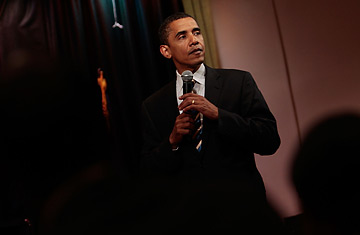
Democratic presidential candidate Sen. Barack Obama of Illinois speaks at a meeting of the Service Employees International Union, Local 1199 August 22, 2007 in New York City.
Correction Appended: August 28, 2007
Once questions have been raised about your foreign policy judgment, it's not easy to put the genie back in the bottle.
But try you must, which is why Barack Obama's latest foreign policy offering, regarding how to open doors with Cuba as the Castro era ends, is at least as much about repairing his image for Democrtic voters as it is about reshaping U.S. relations with Havana. Not that it doesn't deserve a careful look in its own right.
Writing in the Miami Herald, Obama called the Bush approach to Cuba "blundering" and instead laid out a new path toward improved relations: lifting all restrictions on visits to the Island by Cuban Americans (visits are permitted only once every three years now), as well as limits on their financial remittances to kin on the island.
Obama held out the promise of bilateral talks with a post-Fidel regime. But he also stressed that he would refrain from any other concessions until Havana made more dramatic steps toward political reform. "As we reach out in some ways now," Obama wrote, "it makes strategic sense to hold on to important inducements we can use in dealing with a post-Fidel government, for it is an unfortunate fact that his departure by no means guarantees the arrival of freedom on the island."
Given that Hillary Clinton has been all over him for appearing to agree to bilateral talks with dictators too quickly and for making noises about invading Pakistan to go after al-Qaeda, Obama's pronouncements are an attempt to reset the table on foreign policy.
The new approach on Cuba is designed to show that Obama is both innovative and sound; in other words, someone who is experienced but not so experienced that he is stuck in the old way of thinking. "Barack is trying to send a signal of change in foreign policy," one of Obama's foreign policy advisers said. "New century. New challenges, new opportunities, new thinking... What's new here is that we are trying to restore the ability of Cuban Americans to be involved with Cuba — who better than they? On the other hand, Castro has defied all expectations before and though there will be a post-Fidel government, its not likely to be a democracy. So we need stuff in our pocket to [bargain] with."
Whatever it may be saying publicly, the Obama campaign knows its man stumbled in recent weeks on foreign policy and that he needs to start over. But he is not backing away from the idea of changing U.S. foreign policy either. "Barack's judgment on the war has been good. New thinking without judgment just leads to mistakes."
But Obama's latest gambit isn't only about recasting his image — he is also laying down a trademark political bet here. Normally, Cuban policy is never much more than a wash for Democrats: so many Cuban Americans register and vote as Republicans that there isn't much point in trying to woo them with policy proposals, unless they are hard-line, which usually results in pandering charges. But Obama seems to see an opening here others don't: he appears to be making, with this proposal, a pitch for younger voters and newly arrived Cuban immigrants, who have more liberal attitudes about rules regarding money and travel.
Two well-placed G.O.P. sources told me that there is evidence that this group — admittedly a small one — feels much differently from the old guard. Either because they didn't live through the revolution or have immigrated so recently, typically in the last five to seven years, they still feel some tie to the regime, or people who work for it. And one hard-line Cuban-American political activist said that some Cuban Americans resent the Bush Administration's restrictions and are no longer as enamoured of the Republican connection. They are beginning, she said, to think anew. "People are shopping now," she said.
And so once again, the big questions that trail Obama everywhere are at work in the Cuba offering: is he taking on many of the established rules about presidential campaigns, and as a result, is doomed to come up short? Or can he expand the party with his embrace of change on so many fronts that those conventions are overturned?
The original version of this article incorrectly stated that Cuban Americans are currently allowed to visit Cuba once a year. In fact, under current restrictions, they can only visit once every three years.
